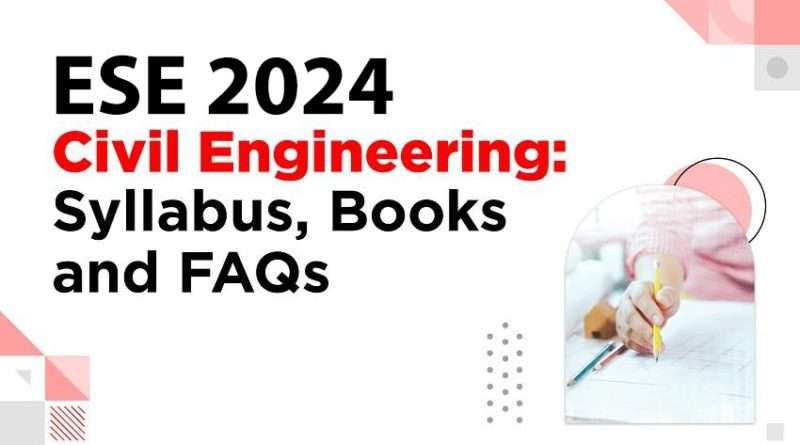The Engineering Services Examination (ESE), also known as the Indian Engineering Services (IES) Examination, is a national-level competitive examination conducted by the Union Public Service Commission (UPSC) for the recruitment of engineers into the Indian government. The ESE is one of the most prestigious engineering examinations in India, and it is considered to be a stepping stone to a successful career in the government sector.
Overview

The ESE may be a two-stage examination, comprising of a Preparatory Examination and a Main Examination. The Preparatory Examination may be a screening test, and it is designed to test the essential building information of the candidates. The Most Examination may be a more comprehensive examination, and it is outlined to test the in-depth information of the candidates in their individual designing disciplines.
Eligibility Criteria
The eligibility criteria for the ESE are as follows:
- The candidate must be a citizen of India.
- The candidate must have a bachelor’s degree in engineering from a recognized university.
- The candidate must have passed the GATE examination in the relevant discipline.
Exam Pattern
Stage | Name of the exam | Number of papers | Duration | Maximum marks |
|---|---|---|---|---|
| I | Preliminary Exam | 2 | 2 hours each | 500 (Paper 1 – 200 Marks & Paper II – 300 Marks) |
| II | Main Exam | 2 | 3 hours each | 600 (300 Marks in each paper) |
| III | Personality Test (Interview) | 1 | 30 minutes | 200 |
Application Process
The application process for the ESE is conducted online through the UPSC website. The application form is usually released in the month of October, and the last date for submission of the application form is in the month of December.
Syllabus
Subject | Preliminary Examination | Main Examination |
|---|---|---|
| Current Issues of National and International Importance Relating to Social, Economic and Industrial Development | 25 Questions | 10 Questions |
| Engineering Aptitude Covering Logical Reasoning and Analytical Ability | 25 Questions | 10 Questions |
| Engineering Mathematics and Numerical Analysis | 25 Questions | 50 Questions |
| General Principles of Design, Drawing, Importance of Safety | 10 Questions | 10 Questions |
| Standards and Quality Practices in Production, Construction, Maintenance and Services | 10 Questions | 10 Questions |
| Basics of Energy and Environment: Conservation, Environmental Pollution and Degradation, Climate Change, Environmental Impact Assessment | 10 Questions | 10 Questions |
| Basics of Project Management | 10 Questions | 10 Questions |
Important Dates
- Notification release: 14th September 2022
- Last date of application submission: 4th October 2022
- Preliminary Examination: 19th February 2023
- Admit card for Preliminary Examination: 27th January 2023
- Result of Preliminary Examination: 3rd March 2023
- Main Examination: 25th June 2023
- Admit card for Main Examination: 5th June 2023
- Result of Main Examination: 2nd September 2023
- Personality Test: October/November 2023
- Result of Personality Test: December 2023
Tips for Exam Preparation
- Start early and give yourself plenty of time to study.
- Join a good coaching institute or take online courses.
- Practice solving previous year’s question papers.
- Get familiar with the UPSC exam pattern and marking scheme.
- Stay motivated and focused throughout your preparation.
FEES
- The application charge for the UPSC ESE exam is Rs. 200 for the Common, OBC, and EWS categories. Be that as it may, SC/ST/PH and female candidates are absolved from paying the expense.
- The application charge can be paid online or offline. To pay online, you’ll be able utilize a credit card, charge card, or net banking. To pay offline, you’ll be able store the expense in any department of the State Bank of India (SBI).
- The application expense is non-refundable. So, make beyond any doubt simply pay the proper expense some time recently submitting your application frame.
FAQ?
The ESE exam is a national-level examination conducted by the Union Public Service Commission (UPSC) for recruitment to the Indian Engineering Services (IES). It is a three-stage examination, consisting of a Preliminary Examination, a Main Examination, and a Personality Test.
A graduate in engineering from a recognized university or institute. * A minimum of 21 years and a maximum of 30 years of age as of the 1st January of the year of examination. * Relaxation in the upper age limit is applicable to certain categories of candidates, as per the UPSC guidelines.
The best way to prepare for the ESE exam is to start early and study regularly. You should also focus on your weak areas and practice solving previous year’s question papers. There are many good books and online resources available to help you prepare for the exam.
 60 minutes of Duration
60 minutes of Duration 100 Questions
100 Questions Instant Report
Instant Report 4 Dimensions
4 Dimensions 500+ Career Options
500+ Career Options 1M+ Test Taken
1M+ Test Taken




